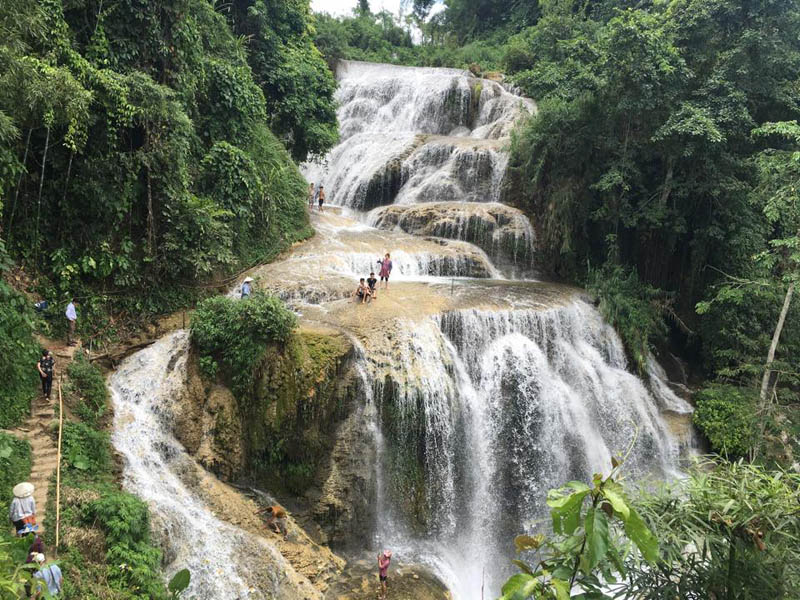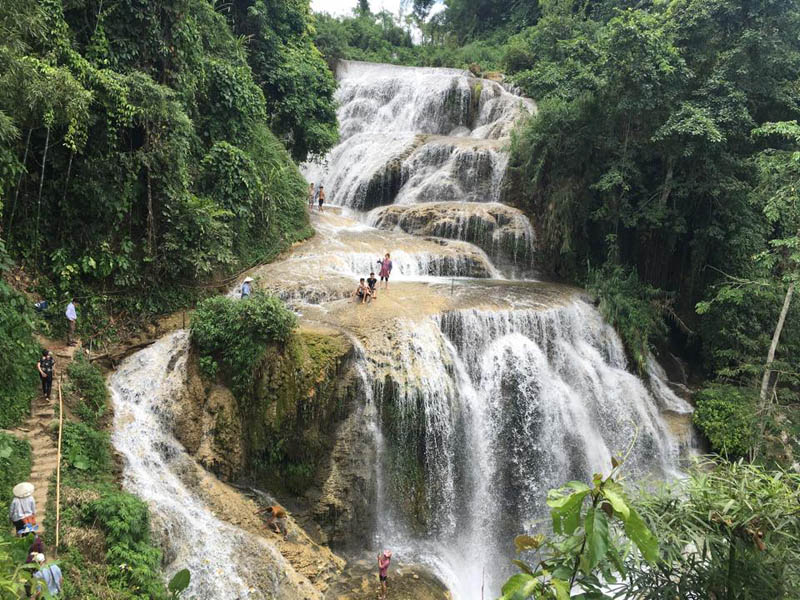
(HBO) – Bumpy roads to Tu Do, a mountainous commune of Lac Son district, Hoa Binh province, cannot hold back footsteps of adventurers who want to explore the beauty of the land and enjoy the pristine nature here.

Mu Waterfall, a tourist attraction
this summer
The commune is favoured by nature with a magnificent
waterfall, called Mu. It is located at
an altitude of over
1,000 min the first stretch of the legendary Truong Son range where water pours down
into a small lake. The deepest point of the bottom of the falls is around
2 metres, not too
dangerous for tourists.
One of the highlights of the
Mu Waterfall is an amazing blue lagoon that is as large as a natural swimming
pool at the foot of the falls. To many backpackers, the destination is like a "heaven”
on the earth.
Below the Mu Waterfall is
Mu cave, a masterpiece of nature that can excite any adventurer. The large cave
has many beautiful statuesque stalactites that look shimmery and vague under
sunlight.
Large fields and terraced
paddy fields, other landscapes together with friendly locals and the simple
rural life here make Tu Do even more appealing to visitors.
Sat Thuong, a village of the
Muong ethnic minority people, was turned into a place renowned for
community-based tours. And Bui Thi Him is one of the local women who firstly
introduced community-based tourism in this remote village.
She said proudly that Sat Thuong is one of
the province’s four nature reserves and also the largest with a primeval
forest. Over 98 percent of its population are Muong people and all families
here live in stilt houses, a tradition that has been kept until today.
Him and some other locals
have joined a community-based tourism model, namely Ngoc Son – Ngo Luong since
the end of 2011. At the same time, six households began offering homestay
services, mostly in the Mu Waterfall area.
With fairly good accommodations
and services, the homestay places have become popular among holidaymakers. Thanks
to that, the commune welcomed more than 10,000 tourists each year, of whom over
500 visitors, including 400 foreigners, stayed at these homestay establishments.
Developing
community-based tourism in Tu Do is part of Lac Son district’s project to boost
tourism by 2020 with a vision to 2030, which has helped the commune unleash its
potentials. The commune plans to cooperate with other tourist destinations in
neighbouring areas like Mai Chau in Hoa Binh and Pu Luong Nature Reserve in
Thanh Hoa in an attempt to further bolster its tourism industry.
The establishment of
community-based tourism villages has brought a new lease of life to Tu Do and
promoted local hidden charms, thus improving incomes for local people.
A diverse chain of eco-tourism and resort destinations concentrated in Hoa Binh city and the districts of Tan Lac, Da Bac, and Luong Son… Along with the launch of several key high-quality resort tourism projects, these developments have reshaped the landscape and enhanced the appeal of Hoa Binh as a travel destination.
Boasting diverse terrain, a mild climate, and rich natural resources, Cao Phong district is increasingly asserting its place on Vietnam’s tourism map, attracting both domestic and foreign visitors. The district is renowned for its stunning landscapes, majestic mountains, a crystal-clear hydropower lake, and the unique cultural identity of local ethnic groups.
With its pristine landscapes, unique cultural heritage of Muong ethnic minority, and an expanding range of visitor experiences, Tan Lac district of Hoa Binh has fast become a captivating destination for both domestic and international tourists.
Until now, Sung village in Cao Son commune, Da Bac district remains the only Dao ethnic community in Hoa Binh province to develop a community-based tourism model. Beyond its untouched natural landscapes, cultural identity serves as the cornerstone attraction for visitors.
Alongside the diverse cultural identities of the Kinh, Muong, Tay, Thai, Dao, and Mong ethnic people, Hoa Binh province is also renowned as the "capital" of the northwestern Vietnamese cuisine, offering unique and distinctive dishes. At festivals, during Lunar New Year (Tet), or on significant family or community occasions, special dishes are prepared, leaving a lasting impression on visitors.
A Phong Linh (Yellow Tabebuia) flower garden in Thang village, Thach Yen commune, Cao Phong district is currently in full bloom, drawing a large number of visitors.



